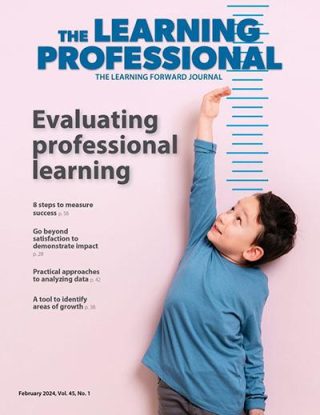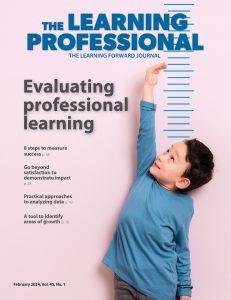New Federal Guidelines Seek to Create Professional Development Programs that are Sustained, Data-Driven, and Focused on Student Instructional Needs
DALLAS (May 1, 2009) – In new guidance to states, the Obama Administration is promoting professional development for the nation’s principals, teachers and other school staff members as a priority for spending economic stimulus funds and jumpstarting school reform and improvement efforts.
The document, The American Recovery and Reinvestment Act of 2009: Using ARRA Funds to Drive School Reform and Improvement, was released by the U.S. Department of Education on April 24. It outlines questions for state and district leaders to consider in allocating ARRA funds, and offers ideas for using the funds to support best practices in standards and assessments, data systems, teacher effectiveness, transforming low-performing schools, and improving student results. The document recommends investments in training and professional development in each of these areas.
“We are pleased that the federal guidelines recognize the importance of strengthening professional learning as a strategy to bolster student achievement,” says Stephanie Hirsh, executive director of The National Staff Development Council (NSDC), the nation’s leading non-profit organization focusing on professional development for the nation’s educators. “The guidelines mention professional development nine times, and urge states to advance professional learning in ways that research says are most effective – through intense, long-term, and collaborative efforts within the school building to use data to address crucial challenges affecting student achievement.”
Suggested uses of ARRA funds to strengthen professional development for teachers and school leaders include:
- Adopting rigorous standards and high-quality assessments. The Department of Education suggests increasing teacher development in accelerated programs, such as Advanced Placement, International Baccalaureate, and dual high-school/college courses, which will pave the way for an expansion of these programs.
- Establishing data systems and using data for improvement. School districts are encouraged to train principals, teachers, and other staff in using data to pinpoint students’ educational needs and the resources to help them, and to adjust classroom instruction to better address students’ strengths and weaknesses.
- Increase teacher effectiveness and equitable distribution of effective teachers. Suggested strategies include:
- Implementing a fair and reliable teacher evaluation system that provides ongoing feedback to teachers about their performance based on objective measures and professional development to support growth in key areas.
- Redesigning teacher professional development and school schedules to ensure that teacher learning opportunities are sustained, collaborative, data-driven, and focused on students’ instructional needs.
- Providing teachers with intense professional development over two years through structured mentoring and teacher networks, preparing them to serve as expert instructional leaders and coaches.
- Focusing special attention on mastering subject matter, particularly for middle and high school teachers in hard-to-staff subject areas such as math and science.
- Training teachers and other school staff to partner with families to improve student learning, communicating individual student progress and fostering family involvement in school activities and decision making.
NSDC supports these guidelines, which are consistent with its extensive body of research and programming. In February, NSDC released a major study, Professional Learning in the Learning Profession: A Status Report on Teacher Development in the U.S. and Abroad, which found that the U.S. lags behind other nations in providing teacher professional development that improves student learning.
The American Recovery and Reinvestment Act of 2009: Using ARRA Funds to Drive School Reform and Improvement is available online at www.ed.gov/policy/gen/leg/recovery/guidance/uses.doc







